Abstract
Recent developments in screening, diagnosis and treatment of colon cancer could lead to a reduction in mortality from this disease. Removal of adenomas, identification of risk factors, appropriate application of accurate diagnostic tests, and aggressive anatomic-surgical resection of colon cancers may already be having a favourable impact. Screening of average-risk populations over the age of 50 also offers promise in the control of this important cancer. The disease is of sufficient magnitude to deserve detection at an early stage with better prospects of patient survival, since screening tests with moderate sensitivity and high specificity are available. Flexible sigmoidoscopy and faecal occult blood tests are sufficiently acceptable to be included in case-finding among patients who are in the health care system. The results of current controlled trials involving more than 300,000 individuals for evaluating the impact of screening on mortality from colon cancer are needed before this approach can be recommended for general public health screening of the population. Further research is required to develop better screening tests, improve patient and physician compliance, and answer more definitively critical questions on cost-effectiveness. Mathematical modelling using current and new data can be used to determine the effectiveness of screening in conjunction with recommendations for primary prevention.
Full text
PDF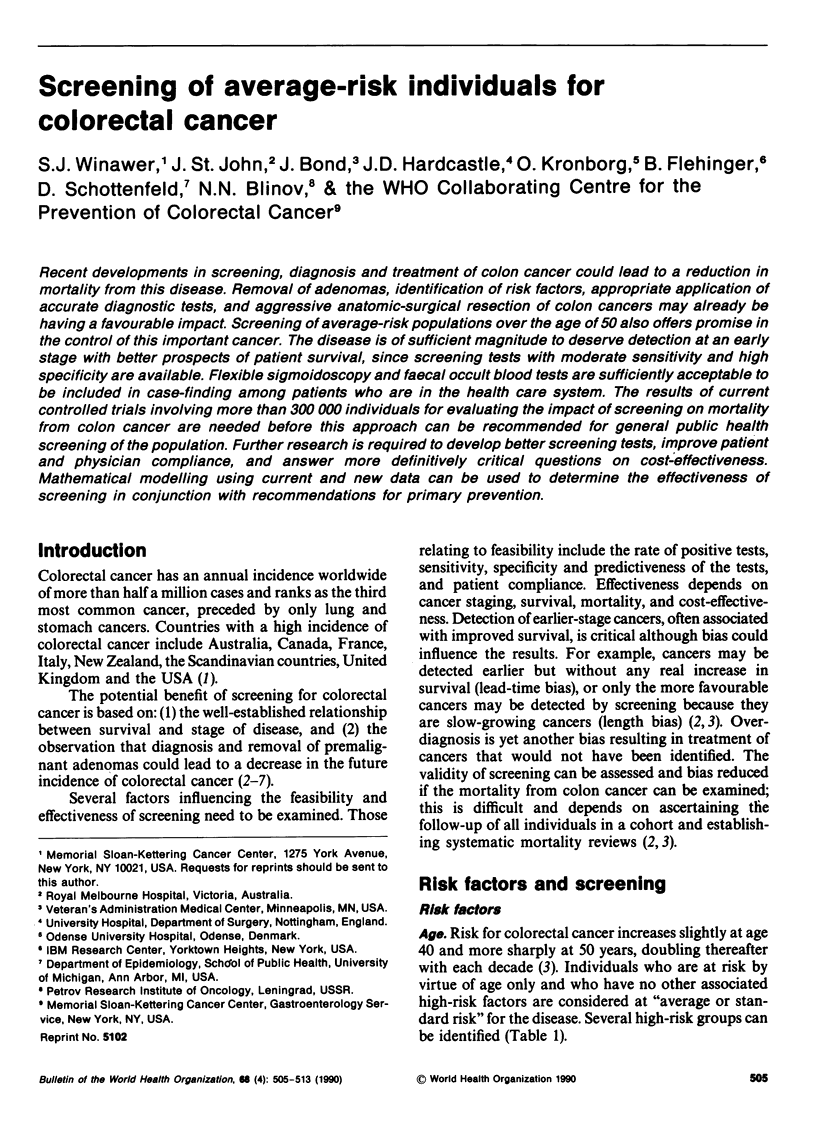
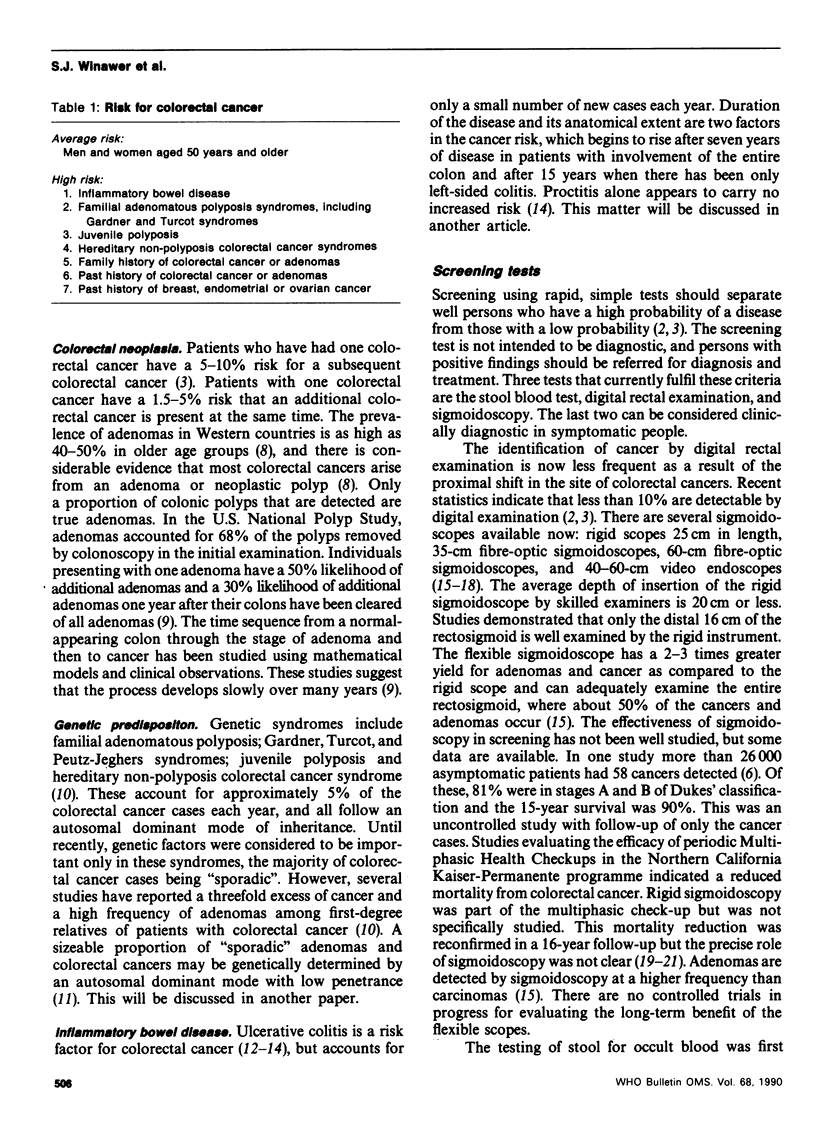
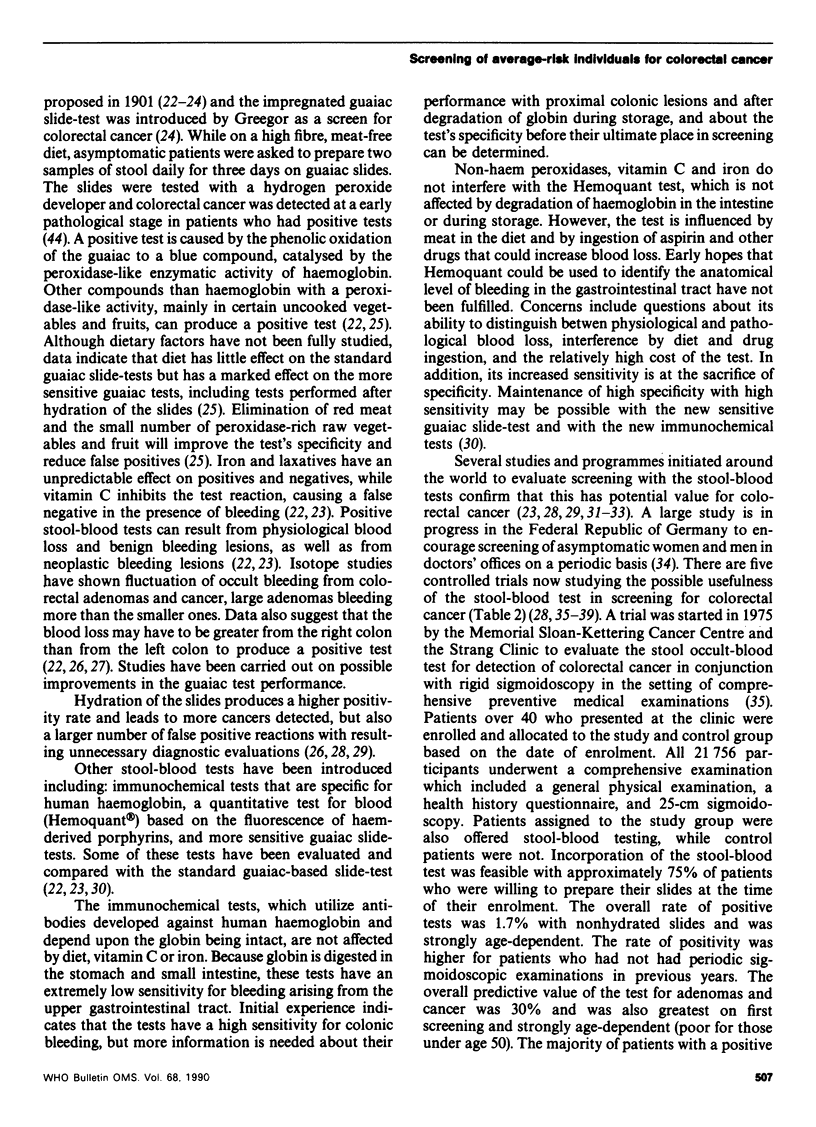
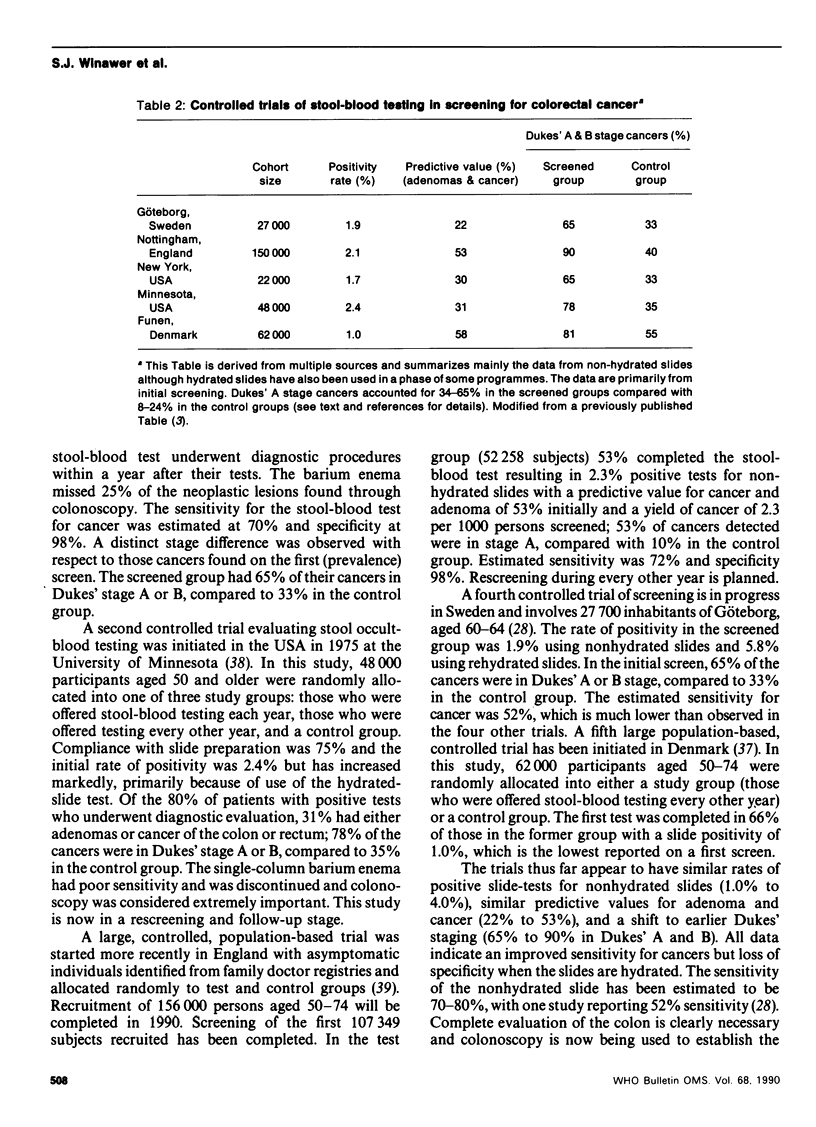
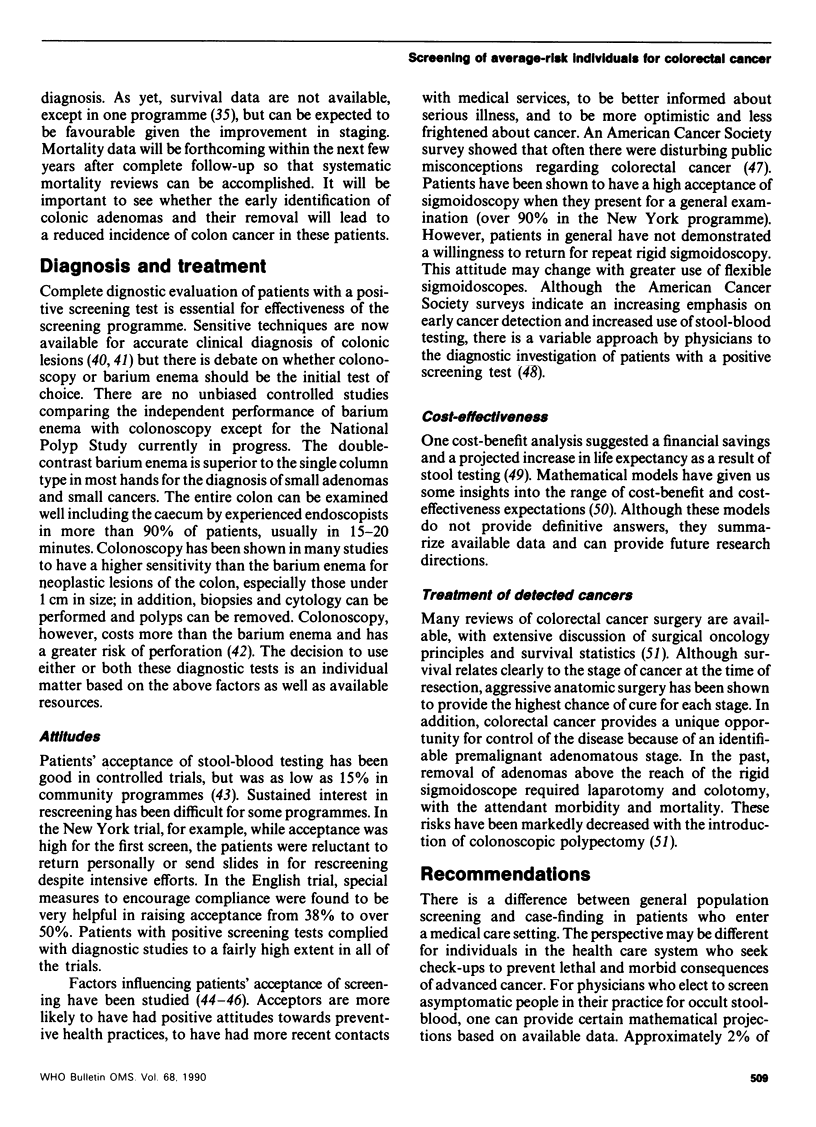
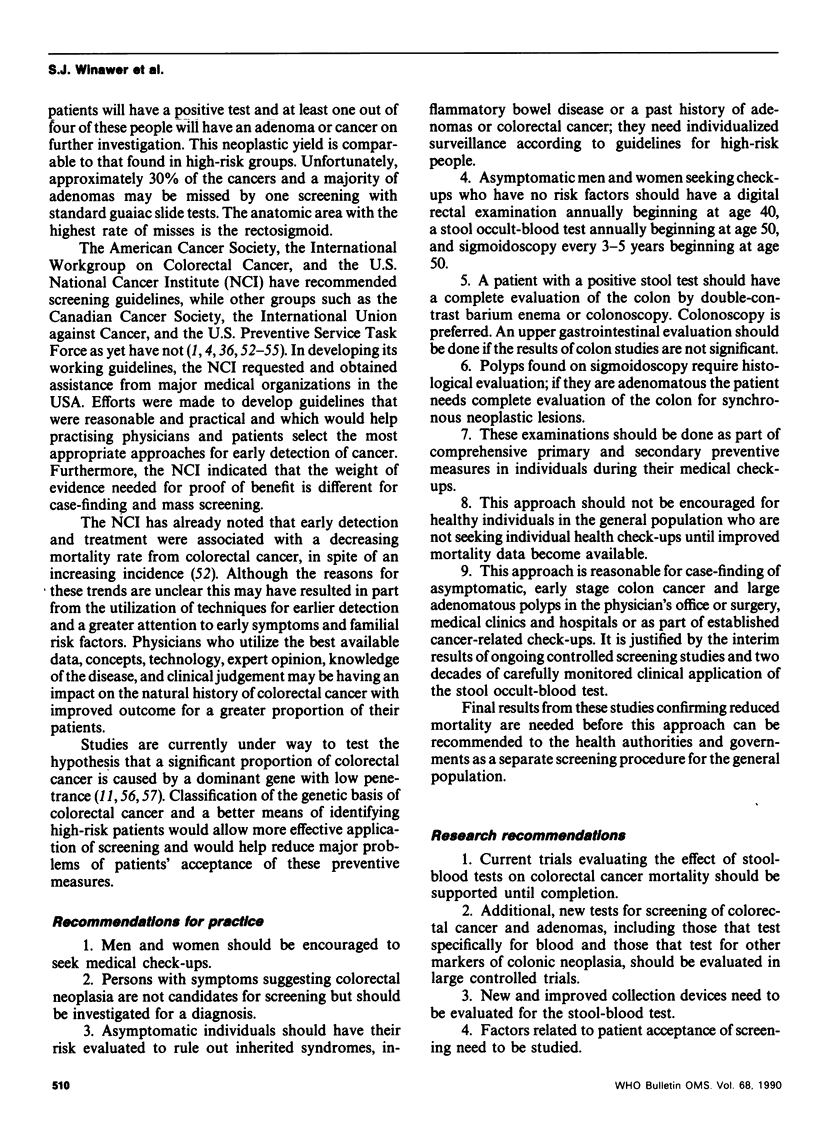
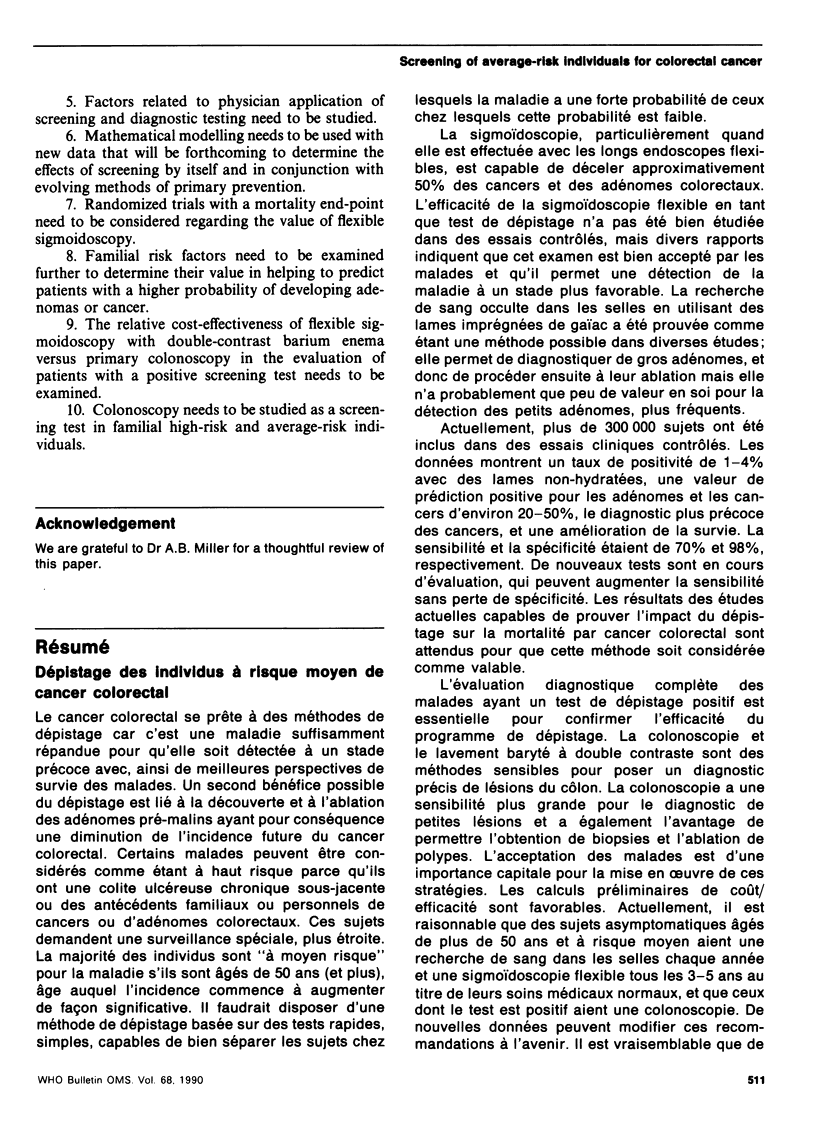
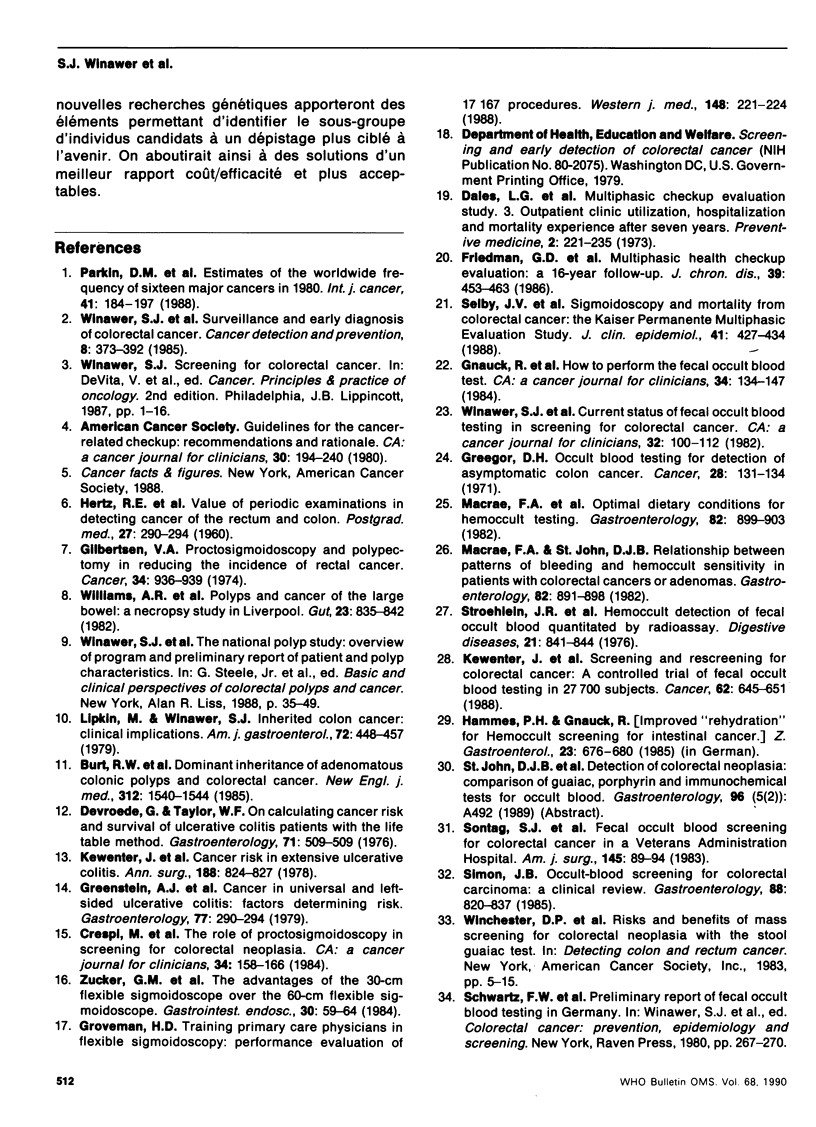
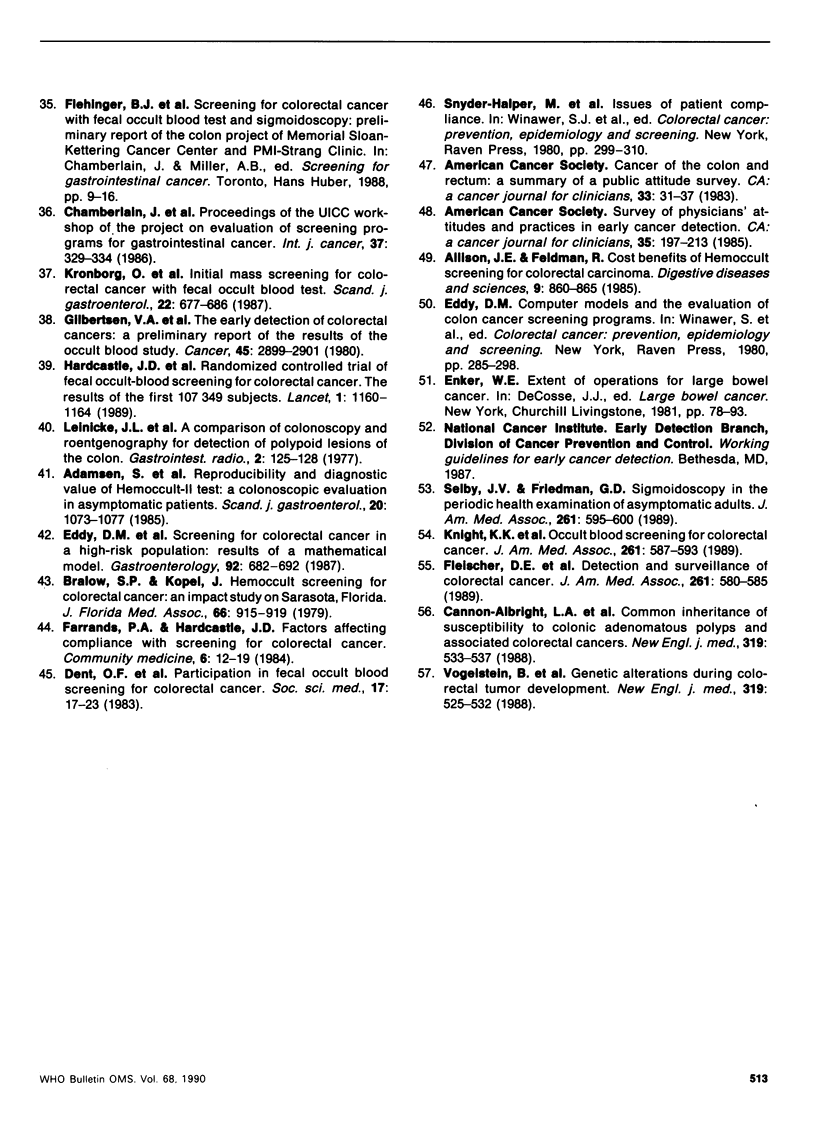
Selected References
These references are in PubMed. This may not be the complete list of references from this article.
- Adamsen S., Kronborg O., Hage E., Fenger C. Reproducibility and diagnostic value of Hemoccult-II test. A colonoscopic evaluation in asymptomatic patients. Scand J Gastroenterol. 1985 Nov;20(9):1073–1077. doi: 10.3109/00365528509088874. [DOI] [PubMed] [Google Scholar]
- Bralow S. P., Kopel J. Hemoccult screening for colorectal cancer. An impact study on Sarasota, Florida. J Fla Med Assoc. 1979 Sep;66(9):915–919. [PubMed] [Google Scholar]
- Burt R. W., Bishop D. T., Cannon L. A., Dowdle M. A., Lee R. G., Skolnick M. H. Dominant inheritance of adenomatous colonic polyps and colorectal cancer. N Engl J Med. 1985 Jun 13;312(24):1540–1544. doi: 10.1056/NEJM198506133122403. [DOI] [PubMed] [Google Scholar]
- Cannon-Albright L. A., Skolnick M. H., Bishop D. T., Lee R. G., Burt R. W. Common inheritance of susceptibility to colonic adenomatous polyps and associated colorectal cancers. N Engl J Med. 1988 Sep 1;319(9):533–537. doi: 10.1056/NEJM198809013190902. [DOI] [PubMed] [Google Scholar]
- Chamberlain J., Day N. E., Hakama M., Miller A. B., Prorok P. C. UICC workshop of the Project on Evaluation of Screening Programmes for Gastrointestinal Cancer. Int J Cancer. 1986 Mar 15;37(3):329–334. doi: 10.1002/ijc.2910370302. [DOI] [PubMed] [Google Scholar]
- Dales L. G., Friedman G. D., Ramcharan S., Siegelaub A. B., Campbell B. A., Feldman R., Collen M. F. Multiphasic checkup evaluation study. 3. Outpatient clinic utilization, hospitalization, and mortality experience after seven years. Prev Med. 1973 Jun;2(2):221–235. doi: 10.1016/0091-7435(73)90066-2. [DOI] [PubMed] [Google Scholar]
- Devroede G., Taylor W. F. On calculating cancer risk and survival of ulcerative colitis patients with the life table method. Gastroenterology. 1976 Sep;71(3):505–509. [PubMed] [Google Scholar]
- Farrands P. A., Hardcastle J. D., Chamberlain J., Moss S. Factors affecting compliance with screening for colorectal cancer. Community Med. 1984 Feb;6(1):12–19. [PubMed] [Google Scholar]
- Friedman G. D., Collen M. F., Fireman B. H. Multiphasic Health Checkup Evaluation: a 16-year follow-up. J Chronic Dis. 1986;39(6):453–463. doi: 10.1016/0021-9681(86)90112-8. [DOI] [PubMed] [Google Scholar]
- Gilbertsen V. A., McHugh R., Schuman L., Williams S. E. The earlier detection of colorectal cancers: a preliminary report of the results of the Occult Blood Study. Cancer. 1980 Jun 1;45(11):2899–2901. doi: 10.1002/1097-0142(19800601)45:11<2899::aid-cncr2820451132>3.0.co;2-m. [DOI] [PubMed] [Google Scholar]
- Gnauck R., Macrae F. A., Fleisher M. How to perform the fecal occult blood test. CA Cancer J Clin. 1984 May-Jun;34(3):134–147. doi: 10.3322/canjclin.34.3.134. [DOI] [PubMed] [Google Scholar]
- Greegor D. H. Occult blood testing for detection of asymptomatic colon cancer. Cancer. 1971 Jul;28(1):131–134. doi: 10.1002/1097-0142(197107)28:1<131::aid-cncr2820280125>3.0.co;2-i. [DOI] [PubMed] [Google Scholar]
- Groveman H. D., Sanowski R. A., Klauber M. R. Training primary care physicians in flexible sigmoidoscopy--performance evaluation of 17,167 procedures. West J Med. 1988 Feb;148(2):221–224. [PMC free article] [PubMed] [Google Scholar]
- HERTZ R. E., DEDDISH M. R., DAY E. Value of periodic examinations in detecting cancer of the rectum and colon. Postgrad Med. 1960 Mar;27:290–294. doi: 10.1080/00325481.1960.11712835. [DOI] [PubMed] [Google Scholar]
- Hammes P. H., Gnauck R. Verbessert "Rehydrieren" das Haemoccult-Screening nach Darmkrebs? Z Gastroenterol. 1985 Dec;23(12):676–680. [PubMed] [Google Scholar]
- Hardcastle J. D., Thomas W. M., Chamberlain J., Pye G., Sheffield J., James P. D., Balfour T. W., Amar S. S., Armitage N. C., Moss S. M. Randomised, controlled trial of faecal occult blood screening for colorectal cancer. Results for first 107,349 subjects. Lancet. 1989 May 27;1(8648):1160–1164. doi: 10.1016/s0140-6736(89)92750-5. [DOI] [PubMed] [Google Scholar]
- Kewenter J., Ahlman H., Hultén L. Cancer risk in extensive ulcerative colitis. Ann Surg. 1978 Dec;188(6):824–828. doi: 10.1097/00000658-197812000-00018. [DOI] [PMC free article] [PubMed] [Google Scholar]
- Kewenter J., Björk S., Haglind E., Smith L., Svanvik J., Ahrén C. Screening and rescreening for colorectal cancer. A controlled trial of fecal occult blood testing in 27,700 subjects. Cancer. 1988 Aug 1;62(3):645–651. doi: 10.1002/1097-0142(19880801)62:3<645::aid-cncr2820620333>3.0.co;2-#. [DOI] [PubMed] [Google Scholar]
- Kronborg O., Fenger C., Søndergaard O., Pedersen K. M., Olsen J. Initial mass screening for colorectal cancer with fecal occult blood test. A prospective randomized study at Funen in Denmark. Scand J Gastroenterol. 1987 Aug;22(6):677–686. doi: 10.3109/00365528709011142. [DOI] [PubMed] [Google Scholar]
- Kussin S. Z., Lipkin M., Winawer S. J. Inherited colon cancer: clinical implications. Am J Gastroenterol. 1979 Oct;72(4):448–457. [PubMed] [Google Scholar]
- Macrae F. A., St John D. J., Caligiore P., Taylor L. S., Legge J. W. Optimal dietary conditions for hemoccult testing. Gastroenterology. 1982 May;82(5 Pt 1):899–903. [PubMed] [Google Scholar]
- Macrae F. A., St John D. J. Relationship between patterns of bleeding and Hemoccult sensitivity in patients with colorectal cancers or adenomas. Gastroenterology. 1982 May;82(5 Pt 1):891–898. [PubMed] [Google Scholar]
- Parkin D. M., Lärä E., Muir C. S. Estimates of the worldwide frequency of sixteen major cancers in 1980. Int J Cancer. 1988 Feb 15;41(2):184–197. doi: 10.1002/ijc.2910410205. [DOI] [PubMed] [Google Scholar]
- Selby J. V., Friedman G. D., Collen M. F. Sigmoidoscopy and mortality from colorectal cancer: the Kaiser Permanente Multiphasic Evaluation Study. J Clin Epidemiol. 1988;41(5):427–434. doi: 10.1016/0895-4356(88)90043-1. [DOI] [PubMed] [Google Scholar]
- Simon J. B. Occult blood screening for colorectal carcinoma: a critical review. Gastroenterology. 1985 Mar;88(3):820–837. doi: 10.1016/0016-5085(85)90158-1. [DOI] [PubMed] [Google Scholar]
- Sontag S. J., Durczak C., Aranha G. V., Chejfec G., Frederick W., Greenlee H. B. Fecal occult blood screening for colorectal cancer in a Veterans Administration Hospital. Am J Surg. 1983 Jan;145(1):89–94. doi: 10.1016/0002-9610(83)90172-1. [DOI] [PubMed] [Google Scholar]
- Vogelstein B., Fearon E. R., Hamilton S. R., Kern S. E., Preisinger A. C., Leppert M., Nakamura Y., White R., Smits A. M., Bos J. L. Genetic alterations during colorectal-tumor development. N Engl J Med. 1988 Sep 1;319(9):525–532. doi: 10.1056/NEJM198809013190901. [DOI] [PubMed] [Google Scholar]
- Williams A. R., Balasooriya B. A., Day D. W. Polyps and cancer of the large bowel: a necropsy study in Liverpool. Gut. 1982 Oct;23(10):835–842. doi: 10.1136/gut.23.10.835. [DOI] [PMC free article] [PubMed] [Google Scholar]
- Zucker G. M., Madura M. J., Chmiel J. S., Olinger E. J. The advantages of the 30-cm flexible sigmoidoscope over the 60-cm flexible sigmoidoscope. Gastrointest Endosc. 1984 Apr;30(2):59–64. doi: 10.1016/s0016-5107(84)72317-0. [DOI] [PubMed] [Google Scholar]


